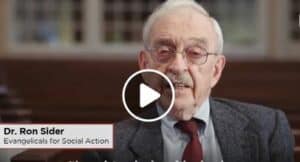
It is for freedom that Christ has set us free! (Galatians 5:1) Jesus paid the price so that we can be free, and for this reason, we can approach him with freedom, confidence, and joy.
We invite you to use this communion liturgy—written largely in the second person for an intimate, conversational approach to connecting with Jesus and understanding his sacrificial love for us—to celebrate, in community, your freedom in Christ. Thanks be to God.
(The leader reads sections in bold. The whole group reads sections in italics.)
Then Jesus turned to the Jews who had claimed to believe in him, and said, “If you stick with this, living out what I’ve invited you to, you are my disciples for sure. Then you will experience for yourselves the truth, and the truth will free you.”
Surprised, they said, “But we’re descendants of Abraham. We’ve never been slaves to anyone. How can you say, ‘The truth will free you’?”
Jesus said, “I tell you most solemnly that anyone who chooses a life of sin is trapped in a dead-end life and is, in fact, a slave. A slave is a transient, who can’t come and go at will. The Son, though, has an established position, the run of the house. So if the Son sets you free, you are free through and through. I know you are Abraham’s descendants. But I also know that you are trying to kill me because my message hasn’t yet penetrated your thick skulls.
(John 8: 31+)
(In preparation for communion, sit together in silence for two minutes.)
Lord, you’d been looking forward to this final meal with your friends. This was the calm before the storm, a moment of rest and fellowship before the terrible suffering that was to come. You told them all this, but they didn’t get it.
You served them anyway, first by washing their feet, humbling yourself to a servant’s posture, doing a servant’s job.
Then you took bread, gave thanks and broke it, and gave it to them, saying, “This is my body given for you; do this in remembrance of me.”
In the same way, you took the cup, saying, “This cup is the new covenant in my blood, which is poured out for you.
Today, we do this in remembrance of you. Because you told us to do it. To remember your sacrifice. To remember your tender and fierce love for us. To be awakened, if only for a moment, from our cluelessness and into reality.
(Pass the bread and cup now.)
Jesus, your body was as fragile that night as ours are today.
You were as subject to distress,
as vulnerable to rising cortisol levels,
as sensitive to pain as we are.
When you gathered with your friends that night, you knew what the night held—
the tearing of your flesh, the spilling of your blood, the breaking of your bones.
Yet no sooner had you shared the bread and wine than a dispute arose among them as to which of them was greatest—like children bickering over who gets to go first. And only minutes after you had knelt and washed their filthy feet, humbling yourself as a servant beneath them!
But you responded as you always do—kindly, patiently, flipping the script and hoping (in spite of all evidence to the contrary) that they would understand.
“Don’t think like that,” you told them.
“The greatest among you should be like the youngest, and the one who rules should be like the one who serves. I am among you as one who serves. Be like me. I’ll give you my kingdom, and you will all eat and drink at my table in my kingdom.”
Such tenderness. Such patience. Such extravagant promises!
(Luke 22:19+)
We come to you today, Lord, because we believe your promises. We come asking you to set the captives free, that they may know their belovedness and dignity as sons and daughters of the King.
The children chained to carpet looms,
the women locked behind brothel doors,
multigenerational families held captive in brick factories,
boys diving from fishing boats,
girls stitching jeans in sweatshops,
the battered, the weary, the hopeless.
Free us, too, Lord—from the prisons that hold us—that we may live as true children of the King.
Free us from our addiction to our phones, our schedules, our plans;
Free us from our habit of numbing ourselves through entertainment, fantasy, and what we take into our bodies;
Free us from worry and self-absorption;
From the lies that blind us;
From our need to be right;
From our fear of failing;
From our foolish measurements of “success.”
We come to you today to remember the truth:
Your body was broken—and resurrected—to set us free from sin.
Your blood flowed so that creation itself might be liberated from its bondage to decay and brought into your freedom and glory.
This is a mystery! We can’t understand it, but we believe, trusting that where your Spirit is, there is freedom.
For it is for freedom that you have set us free. Help us to stand firm! Help us not to be burdened again by a yoke of slavery. Into your merciful hands, Lord, we offer ourselves, that we may learn to love you with all our passion and prayer and intelligence and energy. Amen.
(Romans 6:18, Romans 8:21, 2 Corinthians 3:17, Galatians 5:1, Mark 12:29)
Sing: Eternal Weight of Glory
Now the days and hours and moments
Of our suff’ring seem so long;
And the toilsome wait and wond’ring
Threaten silence to our song.
Now our pain is real and pressing
Where our faith is thin and weak,
But our hope is set on Jesus;
And we cling to him, our strength.
Oh eternal weight of glory!
Oh inheritance divine!
We will see our Lord redeeming
Every past and future time.
All our pains will be transfigured,
Like the scars of Christ our Lord.
We will see the weight of glory,
And our broken years restored.
For behold! I tell a myst’ry:
At the trumpet sound we’ll wake
“Death is swallowed up in vict’ry!”
When we meet our King of Grace
Every year we thought was wasted
Every night we cried “How long?”
All will be a passing moment
In our Savior’s vict’ry song
We will see our wounded Savior.
We’ll behold him face to face;
And we’ll hear our anguished stories
Sung as vict’ry songs of grace.
(Based on 1 Corinthians 15 and 2 Corinthians 4; Words and Music: © 2015 Wendell Kimbrough)
(Most of the scriptures here are quoted from The Message translation.)
Kristyn Komarnicki is director of dialogue and convening for Christians for Social Action. She leads the Oriented to Love dialogue program, helping diverse Christians build unity that is deeper than agreement.
is director of dialogue and convening for Christians for Social Action. She leads the Oriented to Love dialogue program, helping diverse Christians build unity that is deeper than agreement.


